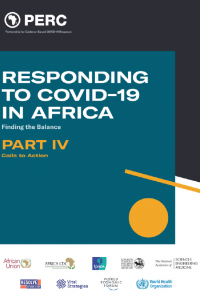
Responding to COVID-19 in Africa: Finding the Balance (Part IV) and Calls to action
Description
At 78%, vaccine acceptance was higher than in the previous PERC survey fielded earlier this year (67%), which may indicate the success of risk communication campaigns. In five surveyed countries—Guinea, Morocco, Mozambique, Tunisia and Zimbabwe—acceptance was 90% or higher. Vaccine acceptance was high among both those who trusted their government’s pandemic response and those who felt COVID-19 posed a personal risk to them or to their country. Such high acceptance contradicts media reports suggesting that low vaccination rates across Africa are due to hesitancy.Among the 20% of respondents who expressed vaccine hesitancy, the top reasons were: low risk perception (24%), not having enough information about vaccines (22%) and lack of trust in government (17%). The reasons for low risk perception are complex, but officials can take concrete action to address them. Offering more and better information to people about COVID-19 and vaccines through trusted sources, particularly health care providers, coupled with consistent and reliable vaccine supply, can further increase acceptance. Respondents’ top information sources included local health centers, television and radio.A number of bottlenecks have contributed to the failure to achieve higher vaccination coverage. Unpredictable supply—in terms of volume, timing and shelf life—threatens countries’ ability to meet demand. When offered, vaccination is frequently inconvenient, requiring people to travel far distances or visit vaccination sites at inopportune times.COVID-19 preventive measures remain crucial to mitigate the health impact of the virus. PERC researchers analyzed what influences support for and adherence to such measures and found that individual actions—handwashing, mask-wearing and social distancing—all garnered support from at least 90% of survey respondents. Such high support suggests that these key measures can continue to be effective strategies for reducing COVID-19 transmission.Preventive measures restricting gathering or movement received less support. Unemployment and food insecurity were widespread among survey respondents and made adherence to restrictive community measures a challenge. PERC researchers concluded that such measures should be targeted to specific, high-risk populations as needed to minimize harm.Income loss also may have had an adverse impact on access to essential health services. Cost and affordability were cited as the primary obstacles to receiving care. Declines in the number of health visits have likely contributed to declines across key health indicators. PERC researchers advocate for urgent investment to stabilize health systems and regain progress lost during the pandemic.Based on their findings, PERC authors recommend:To read the full report, please download it here or visit the PERC website: https://preventepidemics.org/covid19/perc/
